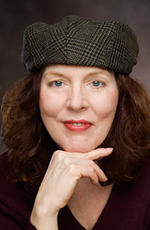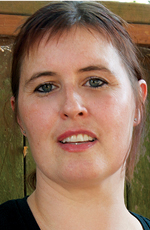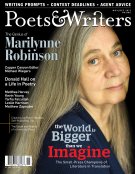 An Editor’s Take
An Editor’s Take
Jessica Page Morrell is the author of six books, including five on the craft of writing, and Voices From the Street: Truths About Homelessness From Sisters of the Road (Gray Sunshine, 2007). Originally a caterer and then a food writer, Morrell now writes, edits, teaches writing, and participates in writing workshops around the world.
The perfect candidate to self-publish is a workaholic. Self-publishing takes more work than having a traditional publisher. Either you’re doing it all yourself or you’re hiring your own team. You need to have a broad range of skills and a lot of contacts. It’s not just about the writing. You need energy, vision, and an understanding of what’s going on in the marketplace. Sci-fi and romance are great genres for self-publishing. Hertling did his homework and used his technology background in developing his themes and finding his audience. Writing about topics you’re knowledgeable and passionate about is a smart approach for self-published authors. Hertling knew his readers and what would appeal to them.
While some self-published authors, such as Hugh Howey (Wool) and Paul O’Brien (Blood Red Turns Dollar Green), have been very successful, many self-published books are mediocre or worse. Too many people want to rush their books out as soon as they finish the writing. Fortunately, I’m now seeing authors who want to be taken more seriously, so they’re using developmental editors. You need critical beta readers and copyeditors; you should learn how to be an analytical reader yourself. Just as you can’t skip steps in a recipe or the cake won’t rise, you can’t overlook the requisite steps of the publishing process.
When you’re hiring a developmental editor, do your due diligence: There are many unethical people out there whose services aren’t worth your money. Ask other authors for recommendations. Get references and ask specific questions about the editor’s strengths and weaknesses. Make sure you have a contract that spells out deadlines and delivery terms. Your editor should communicate regularly by phone and e-mail and not disappear for weeks or months. Authors, for their part, need to respect the editor’s time. Don’t expect experienced editors to provide samples or edit chapters for free. If you’re hiring someone to improve your work, you need to be receptive to that professional’s comments and recommendations for revisions. Recently I told an author that the opening of her book didn’t work and she should start with the material she currently had in a later chapter. She didn’t respond well to my suggestion.
A good developmental editor will help ensure your ideas are fresh, the voice appropriate, and the material not repetitious. When I’m editing a novel, I make hundreds of comments and provide a detailed memo outlining my suggestions on closing plot holes, listing “crutch” words that should be changed, cutting out prepositions, etc. I do more than editing. I’ll write pitch letters for my authors since I know the books so intimately.
My best advice, beyond getting editing help, for self-published authors:
• Spend time coming up with a creative title. Titles do sell books.
• Covers are incredibly important. You can get a very strong cover designed for less than $5,000.
• If you use social media, have conversations; don’t just plug your book. Approach social media with a spirit of generosity. Hertling wrote very interesting blog posts and his readers were getting something valuable.
 A Publicist’s Perspective
A Publicist’s Perspective
Jessica Glenn founded Mindbuck Media, a full-service publicity firm for authors, in 2006. Prior to that she was a freelance writer and also developed online communities and the website for the A&E reality show Inked.
It’s very hard for any book—especially one from a small publisher, and even more for one that’s self-published—to get review attention and sell well. A publicist can make a huge difference, but even with our best efforts we can’t always make a book sell. And when a book does sell, it can sometimes be difficult to tell which campaigns led directly to a spike in attention. That’s probably why some authors resist hiring a publicist; the results of our work are not always obvious. You can see the difference when a designer creates a great jacket or an editor improves the writing, but a publicist’s work is less tangible and results aren’t guaranteed.
We often work with self-published authors, and we tell them their books must be of the same quality as those from mainstream publishers. Sometimes we suggest they hire an editor and revise the manuscript. Other times we’ll insist that an author push back publication if he or she wants us to handle publicity. The book must be professional—it must appear professionally made, and be professionally presented—if a reviewer is going to give the book a fair shot. Reviewers want to influence their readers and persuade them to try something new. That’s why we need a long lead time to do our best work. For example, we’ve had great success getting self-published titles reviewed in Publishers Weekly because we follow the submission guidelines and submit roughly four months prior to a book’s on-sale date. If the PW review is favorable, the author can add it to the book jacket, to a website, and to subsequent books’ jackets.
Our campaigns are focused on getting mentions and reviews. We have found giveaways to be very effective. Goodreads giveaways can create buzz. Even offering one or two free copies to online reviewers can change the energy of a campaign.
Sometimes we’ll do a Q&A with an author and send it to the media. Social media is important and we encourage authors to use social media campaigns to promote their books. We focus on publicity but will also work cooperatively with a social media firm.
My advice to self-published authors:
• Hiring a publicist is your best shot at getting media attention, reviews, and, ultimately, book sales. Talk to three publicists before choosing one. You want to make certain that you and the publicist are a good fit—and be sure to compare costs and services. For example, we can do a traditional campaign for five thousand dollars. With a larger budget, however, we have more flexibility. We can experiment with newer tools such as Klout, through which we can pinpoint a target audience most likely to purchase a particular book.
• Never send out a huge e-mail blast to hundreds of reviewers. Research the blogs and establish personal relationships; find the people who are most likely to be interested in your work. As publicists, we’ve spent thousands of hours researching the media. We regularly pitch books to about two hundred people, but depending on the subject matter and the author’s background, we find an additional twenty or so unique outlets for each title we’re handling.
• Don’t post repeatedly on Facebook or other social media platforms telling people to buy your book.
• Participate in a variety of online communities. If you’re only joining author groups, you’re likely to get pitches from other authors trying to sell their books.
• If someone promises to increase your social media followers from a handful to thousands overnight, run the other way. This kind of interaction is meaningless.
• Don’t be stingy. Be ready to give away some books, especially e-books. Think about the long-term picture rather than just the cost of giving away books.
• Be creative. Think of ways to connect your book to a cause, such as a charity. Sales can increase if you’re doing some good while promoting your book.
Debra W. Englander is a New York–based freelance editor and writer. She managed a business-book program at John Wiley & Sons for nearly seventeen years and previously worked at Money magazine and Book-of-the-Month Club. She has written about business and books for numerous publications, including USA Today, Good Housekeeping, and Publishers Weekly.








